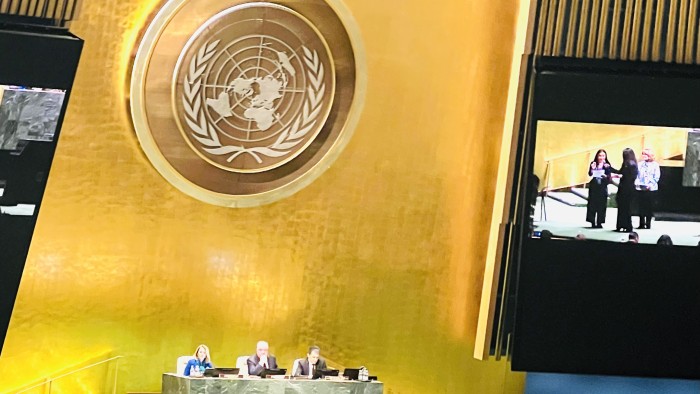Funding Clean Water for All at the United Nations Water Conference

In Brief
Two billion people lack adequate water, according to the United Nations. That will worsen.
At its first conference on the topic this century, the organization raised hundreds of pledges for innovative financing.
Our reporter was there (as was Matt Damon), and brings you this summary.
In many parts of the world, clean water is still an untapped market – but a flow of innovative finance is beginning to change this. Currently, the United Nations estimates that between $182 billion to over $600 billion annually is needed to address the global water crisis. Worldwide, millions of women and children spend hours every day gathering water. Lack of access to clean water further entrenches cycles of poverty, and further pollutes ecosystems without needed sanitation infrastructure. Yet, even as droughts and desertification caused by climate change deepen existing divides, there is a groundswell of support for water finance.
Earlier this spring, the United Nations held its first Water Conference in almost fifty years. Diplomats from all corners of the globe gathered to discuss access to clean water and sanitation, or Sustainable Development Goal 6, as well as what can be done to protect and preserve aquatic ecosystems. Beyond solely government and NGO leaders, the summit also brought together numerous youth delegates, united in the campaign to #FillUpTheGlass for the roughly two billion people globally who lack access to clean water and sanitation.
In addition to the millions of people worldwide without safe drinking water, the UN estimates that up to 40 percent of the world’s population are affected by water scarcity. This burden falls disproportionately on women and girls. Girl Rising fellow Hilda Flavia Nakabuye, speaking during the conference’s closing plenary, described the role of women as “water keepers” in her village near Lake Victoria, Uganda, and the urgent need to include women and girls in water finance. “My country experiences some of the worst effects of climate change, but contributes less than 1% to global greenhouse gas emissions… There is an urgent need to scale up women and girls’ empowerment in water programs. If we do not, young women will be the hardest hit by droughts… Funding should be made accessible to youth organizations that are passionately working to improve women and girls’ access to water.”
From Lake Victoria to the Aral Sea to melting glaciers in the Himalayas, the summit covered a kaleidoscopic array of issues, culminating in what the UN calls a “bold Water Action Agenda.” Central to this agenda – spanning more than 700 pledges, with more trickling in in the days after the summit – is financing. The United States pledged up to $49 billion to global water security and sanitation, building on the first-ever White House Action Plan on Global Water Security, announced this past summer by Vice President Harris. The U.S. commitment also spotlighted inequalities in access to clean water within the United States, especially in Native American communities, who are an estimated nineteen times more likely to lack access to indoor plumbing than non-Native households. Other countries around the world similarly stepped up; Vietnam pledged to improve management of river basins and ensure all households have access to clean running water by 2030, and Mozambique similarly seeks to mobilize $9.5 billion to ensure access to clean water for all of its citizens by 2030. The E.U. set a goal to support improved access to clean water and sanitation for 70 million people, and Japan also pledged over $3 billion in funding for water infrastructure over the next five years.
In addition to public finance, the UN Water Conference also highlighted how the flow of private finance is helping to fill needed gaps. Matt Damon, actor and co-founder of Water.org, explained what inspired him and his co-founder Gary White to invest in clean water. “As I was starting to learn and get a deeper understanding of issues of extreme poverty, I was just really shocked at how water underpinned everything… it really touched all of these different issues.” Damon described collecting water with a young girl in rural Zambia. “She reminded me of Ben Affleck and I at that age like ‘we’re going to move to New York, we’re gonna be actors.’ That’s what you do at that age, you have these big dreams and big plans…I realized that had someone not had the foresight to sink this bore well a mile from this kid’s house, she wouldn’t have been in school that day. She would have been off looking for water for her family…”
Water.org uses innovative microfinance loans to provide support for people without access to clean water, and estimates that they have reached over 53 million people, with a payback rate of 99 percent. Beyond solely the numbers, access to clean water can also significantly improve human health, and reduce early childhood mortality. Damon and White estimate that the cost per person of providing clean water will actually decrease over time, as loans are repaid and access to clean water improves earning power. For this reason, they believe a microfinance model may be more scalable than other approaches.
The United Nations plans to continue supporting clean water advocacy and financing globally, and is also considering appointing a Special Envoy for Water. Although the extent to which countries will follow through on their pledges remains to be seen, the UN Water Conference marks a watershed moment for aquatic ecosystems and human rights globally.